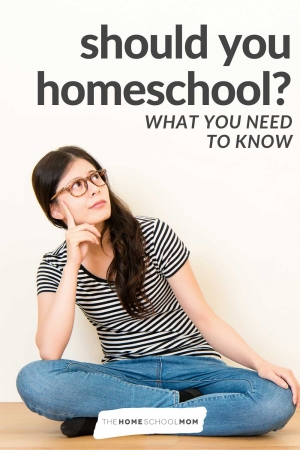What Now? Homeschooling?
As schools around the country publish their plans for the upcoming academic year, homeschool advocates continue to see more families who tried homeschooling last year deciding to continue.
For real, this time-not the suddenly-home-from-school situation parents faced when schools suddenly closed.

You may be one of them, or as an already-established homeschooler, you may be helping a friend or family member transitioning from suddenly schooling at home to independent homeschooling.
Parents coming to homeschooling from the crisis experience of "remote public school, done at home" often haven't had the opportunity to learn about independent homeschooling.
Here are a few suggestions of things to consider.
Decide if homeschooling is right for you
As Amanda writes, "Choosing to homeschool is not an irreversible decision any more than putting [your children] in a certain school or using a specific curriculum (although there are special considerations for homeschooling high school), but it will affect your whole family, so it's worth putting some thought into."
Here is what you need to know in order to decide if homeschooling is right for you.
If you decide homeschooling is the best option for your family...
Do the paperwork
Families were thrust into "school at home" when public schools closed, and they did so with full knowledge of public school officials. In many states, intentional homeschooling and opting out of public school requires notification to the school division or state department of education. Not following the laws around homeschooling can result in truancy charges. Check state homeschool laws.
Consider deschooling
Parents might be homeschooling for a limited period, planning to send kids back to school in the future. This can be at odds with the first advice most new intentional homeschoolers get, which is to "deschool."
That's right, the suggestion is to take a break from "school ways" and learn how kids can learn at home. Read about deschooling. A homeschooling parent recently told me "deschooling is the best advice I avoided-and I ended up having to do it anyway."
You may find your kids make more progress when you take time to re-connect with them instead of pushing school-type academics on a school calendar.
Watch those high school credits
In some states, public high schools will not award or accept credit for learning done as an intentional, independent homeschooler. Enrolling in a program provided by and administered by public school might be preferable. Yes, that would still be "public school at home."
If your high schooler plans to return to public school, you should research how high school learning done at home could be done for school credit. Of course, we don't know if these unusual circumstances will make schools more or less flexible.
Expect that your curriculum might not work
Go ahead, choose a curriculum. Or put together many resources to make your own program. But understand that homeschoolers experiment with and change curricula frequently, and some, including highly successful homeschoolers, don't use a curriculum or "program" at all. Expect adjustments!
Understand that this still isn't normal homeschooling
Homeschoolers are known to joke about how they are never actually at home. We homeschoolers love our co-ops, but the ability to gather in groups has changed with state mandates restricting public gatherings. Physical distancing restrictions vary by state, and how homeschool co-ops and classes choose to implement them may or may not mean that even though you are really homeschooling, this isn't normal homeschooling.
Explore "bubble schooling"
For homeschoolers who want or need to continue physical distancing, consider "bubble schooling." Come together with another family or a few families who share similar feelings about risk and make a "bubble" or "quaranteam" with them.
You could share simple field trips, create a small co-op, get together for playdates, and tutor one another's children through tough spots.
Be honest with each other about each family's exposure to "the rest of the world." Set expectations for how the bubble would change if one family needs to start interacting in the public more or even if someone gets exposed or becomes sick.
Some things to decide:
- where you feel safest meeting
- what the hand-washing expectations will be
- what the mask-wearing expectations will be
Bubble schooling won't give your kids the usual range of social and academic activities available to homeschoolers during normal times, but it might be lower risk than school attendance or participation in a large indoor co-op.
If you're not concerned about exposure risk, of course you won't be interested in forming "social bubbles" with other families.
Risk tolerance, personal risk factors, and perceptions of the risk level vary widely. That's a great topic of discussion with your middle schoolers and high schoolers. Have them join you in googling up some articles and studies about why risk is perceived differently.
If you do decide to bubble school with others, share and discuss articles like this one from the MIT Technology Review that gives suggestions for negotiating a "bubble" with other people.
You'll navigate your best homeschool year by seeking to understand.
Frequently asked questions
We've got all the info for getting started at our Homeschooling 101 tab, and the topics above cover some important first concepts. In addition, we've seen potential homeschoolers recently ask the following questions:
Similarly, "What's the best curriculum to use?"
Our homeschool curriculum reviews are filled with homeschooler feedback about books, curriculum, online schools, and other resources. Keep in mind that what works for another family may sound wonderful and be a disaster for your family.
The short answer is no, it's not, but that's not a concern. For the longer version, see our post Is Your Curriculum Accredited? Does It Matter?
Similarly, some people ask if their homeschool needs to be accredited. No state requires that a homeschool be accredited; find out more in What Is Accreditation? Should My Homeschool Be Accredited?
It is possible to homeschool and work full-time, but it takes creativity and commitment. Keep in mind that homeschooling while working is a completely different situation than working while trying to supervise virtual public school at home, since the latter is scheduled and controlled by the school district. If you are homeschooling under your state's homeschool statute, you have more flexibility and will be able to take advantage of these ideas to balance homeschooling and working full-time.
As Jeanne has previously written,
"Considering a homeschool online program is common . . . because it seems like an all-in-one package deal that would smoothly and comprehensively take the place of school.
"It's important to realize that many online programs like the one you mention are not online homeschool programs; they are online public schools. To put it bluntly, they are not homeschooling. They are public school at home.
"This may seem like semantics, but the distinction is important . . .
"This matters because if an online program is public school at home," you have to follow public school rules rather than homeschool laws. Mandatory testing and assignments may be quite stressful. This may not give you the curriculum, flexibility, customized learning, or reasonable workload that your kids need."
For a more in-depth discussion of the differences along with pros and cons, read Ask Jeanne: Online Homeschool Program.
Similar to the previous question about virtual schools, questions about hybrid homeschooling sometimes involve answers related to public school control. For a detailed answer, head over to Education Hybrids: Is This Homeschooling?
It depends. Find out why in our post Can Somebody Homeschool My Kids?
Although written with an eye toward college, College Admission Requirements: Homeschooling High School is a good starting place for thinking about credits and courses for high school.
Parents in some states might receive funds to purchase curriculum, activities, or supplies, or to pay for online curriculum or courses up to a specific allowable amount, or they might receive curriculum that is distributed by the state. There are pros and cons to receiving state money to homeschool, so be sure to consider them carefully. For more information, read Ask Jeanne: Money for Homeschooling My Kids?
Being able to meet current needs now is an important benefit of homeschooling, but there are additional considerations for parents of kids with anxiety. Learn what you can do to improve the chances of having a successful homeschool year in Tips for Homeschooling an Anxious Child.
With many families planning to homeschool only until the public school situation returns to normal, this is an important question to ask. Here's what you should expect when your child goes from homeschooling to public school.




 Mary Ann Kelley lives in coastal North Carolina with her husband and has two grown daughters, both homeschool and college graduates. Mary Ann, who homeschooled for almost 20 years, is a Virginia Tech graduate and lifelong learner. Mary Ann has been featured in interviews on Money.com, HuffPost, and in the Free Lance-Star newspaper. Her desire is for the content on TheHomeSchoolMom to encourage and empower parents and children to take personal responsibility for their own educational options and choices. In her free time, Mary Ann enjoys reading, traveling, genealogy, and volunteering for the Atlantic Beach Sea Turtle Program.
Mary Ann Kelley lives in coastal North Carolina with her husband and has two grown daughters, both homeschool and college graduates. Mary Ann, who homeschooled for almost 20 years, is a Virginia Tech graduate and lifelong learner. Mary Ann has been featured in interviews on Money.com, HuffPost, and in the Free Lance-Star newspaper. Her desire is for the content on TheHomeSchoolMom to encourage and empower parents and children to take personal responsibility for their own educational options and choices. In her free time, Mary Ann enjoys reading, traveling, genealogy, and volunteering for the Atlantic Beach Sea Turtle Program.

My daughter did k-12 last year but we had alots of prombles was wanting her to stay home schooled in kokomo indiana Howard county were we live
Hi Tammy - As we mention above, K12 is actually public school at home which means you don't get all of the benefits of homeschooling. There are many other options out there, so hopefully you will be able to use the resources in this article to find the right solution for your family. Best wishes to you!
Thank you, your comparison of homeschooling and virtual public school made things clear to me. I am a grandmother who helps in the homeschooling of my grandson and we were considering the virtual public school until i saw the difference. You will never know how much your article has done for us, again thank you.
Hi Michele - I'm so glad you were able to use the information. Best wishes as you and your daughter her children homeschool this year!
It's not an easy decision for many parents. Especially for those who have never thought about homeschooling before. But I think that if you want to do it full time, this autumn is a great chance to give homeschooling a chance. Especially when there are so many instructions and information online.
Absolutely! It's important for new homeschoolers to remember that even with committing to really homeschool (as opposed to doing school at home), this isn't what homeschooling normally looks like. As things return to normal—or adjust to a new normal—new homeschoolers will be able to take advantage of all of the things that make homeschooling easier and more fun, like co-ops and field trips and proms and park days. Until then, we all are just hanging in there making the best of the situation.